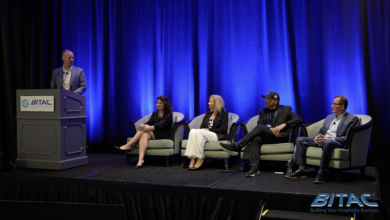
Exploring the Future of Hospitality IT: Insights from the 2024 BITAC Owners Fall Event Panel Discussion
By Gavin Fraser | January 14, 2025
The 2024 BITAC Owners Fall event gathered a distinguished group of industry experts to explore the future of hospitality technology, spanning infrastructure investments to the latest AI innovations. This year’s panel included Page Petry, a strategic advisor at Sinclair Digital with over 30 years of experience in hospitality IT, and Nelson Garrido, Senior Vice President of Information Technology at Brookfield Properties. Together, they shared invaluable insights on the evolving trends, challenges, and opportunities shaping the hospitality tech landscape.
The Foundation: Why Network Infrastructure is Key
The discussion opened with a powerful point about the critical importance of investing in robust network infrastructure. Both Page and Nelson emphasized that no matter how advanced or flashy the technology, everything relies on a solid, secure network.
Page underscored that this often-overlooked aspect of hospitality technology is vital for ensuring that guest-facing services and operational tools can perform optimally. If that network isn’t solid, nothing else you invest in will materialize fully. For hotel owners, this means that investing in network upgrades isn’t just a technical necessity; it’s a business strategy that directly impacts guest experience and long-term profitability.
Nelson, who oversees IT for Brookfield Properties, echoed this sentiment, focusing on the impact of network infrastructure in the context of hotel sales. For properties being renovated or sold, ensuring that technology works seamlessly can significantly increase the property’s value. Yet, he acknowledged that network upgrades aren’t the “sexy” investments that owners often want to prioritize. To convince owners, focus on the guest experience and the smooth functioning of technology for your team. Technology investments should be viewed as a way to enhance both guest satisfaction and employee productivity.
Managing Brand Standards and Security Requirements
A common challenge for hotel owners is balancing the demands of hotel brands with financial constraints. Nelson highlighted how the COVID-19 pandemic temporarily eased pressure from brands, but now those requirements are returning in full force. Brands frequently push for upgrades in areas such as network security, guest-facing technology, and more. While these requests are necessary for maintaining brand standards, they can often strain budgets.
The panel discussed how owners can navigate this push-and-pull dynamic by focusing on long-term planning. You need to be proactive about your three-to-five-year strategy, Page suggested, referencing the importance of anticipating brand-driven tech requirements before they become urgent. By forecasting what will need to be upgraded or replaced, owners can better manage capital expenditures and avoid sticker shock when brand mandates come through.
Nelson added that maintaining a good relationship with brands is crucial, particularly when it comes to making difficult decisions about which projects to prioritize. We don’t compromise on security or safety, but you have to make choices, he said, noting that security patches and upgrades, while critical, can become overwhelming for hotel teams.
AI and Robotics: The Future of Hospitality Tech
One of the more compelling topics of the discussion was the potential of AI and robotics to transform the hospitality industry. While automation can’t replace the human touch that is central to guest experience, it can alleviate some of the burdens on understaffed hotels. Both Page and Nelson agreed that AI and robotics have significant potential in non-guest-facing areas.
Nelson highlighted how AI can take over repetitive tasks, freeing up employees to focus on high-touch customer service. AI can help with things like training employees or automating repetitive jobs that don’t require human interaction, he explained. Robotics, too, is gaining traction for tasks like cleaning common areas or delivering room service, which can enhance efficiency without compromising the guest experience.
Page elaborated on AI’s use in internal processes, such as employee training and knowledge management. She suggested that AI-powered tools like ChatGPT could be deployed to help staff quickly access training materials, internal documents, or HR information without requiring human intervention. While this kind of AI implementation is still in its early stages, it holds the promise of improving staff efficiency and satisfaction.
Sustainability: Technology’s Role in Eco-Friendly Operations
Sustainability has been an increasingly important focus for the hospitality industry, and technology plays a vital role in advancing these goals. The panelists discussed how technology can help drive sustainability efforts, from energy management systems to smart thermostats and eco-friendly building operations.
Page pointed out that sustainability should be integrated into the very DNA of a property, not just a box to check. It’s about how you’re operating—your heating, lighting, and power systems—and driving costs down, she explained. While technology is a crucial tool for sustainability, she emphasized that it’s not just about implementing tech solutions but about creating an environment where sustainability becomes ingrained in day-to-day operations.
Nelson agreed, noting that while energy management systems can contribute to more sustainable operations, the biggest challenge often lies in engaging the staff. How do you drive behavior change in your teams to do the right thing? he asked. This requires consistent training and clear communication about the importance of sustainability.
Both panelists acknowledged that sustainability efforts extend beyond just engineering and green technologies—it’s about cultivating a mindset within the organization. For example, employee engagement is key in ensuring energy-saving initiatives are consistently followed.
Data and Analytics: Leveraging Insights to Improve Operations
One of the most valuable insights from the panel came from the conversation about the potential of data in hospitality operations. Page emphasized that the systems already in place in hotels are overflowing with valuable data that can be leveraged to improve efficiency, guest experience, and ultimately, profitability.
Many times, we only use half of the systems we have in place because over time, our knowledge of how to pull reports degrades, she said. Page suggested that hotel operators can do a much better job of training teams to fully utilize the systems already available to them. This could include optimizing operational processes, managing guest preferences, or even enhancing marketing efforts based on guest data.
For hotel owners looking to pitch technology upgrades to investors, leveraging this data is key. Data from your systems can help you make the case for the next round of technology investments, Page explained. Whether it’s tracking maintenance issues or measuring guest satisfaction, data-driven decision-making is a powerful tool for building the case for technology enhancements.
Building a Balanced, Secure, and Smart Hotel Tech Strategy
The panel discussion at the 2024 BITAC Owners Fall event provided attendees with a wealth of insights on the future of hospitality IT. From investing in strong network infrastructure to embracing AI and robotics, the key takeaway was that the future of hospitality technology is not just about keeping up with the latest trends but about making strategic investments that enhance the guest experience, improve operational efficiency, and drive long-term profitability.
Hotel owners and operators need to prioritize robust security, engage with brand requirements proactively, and focus on data-driven decision-making. At the same time, they must remain open to new technologies that can help them navigate challenges like staffing shortages, sustainability goals, and increasing guest expectations.
As technology continues to evolve, so too will the opportunities for hospitality to adapt and thrive in a digital-first world.





Get involved!
Comments